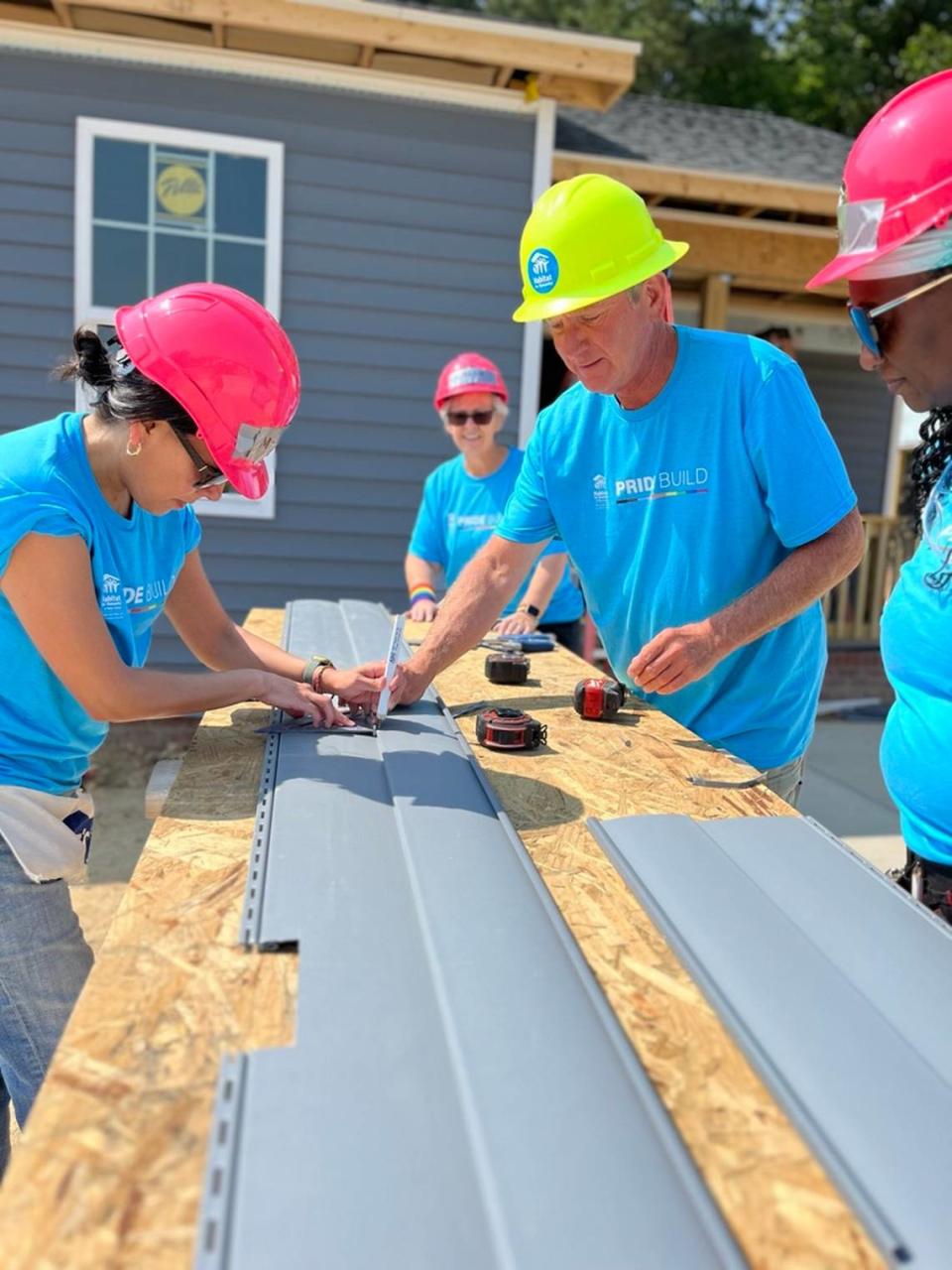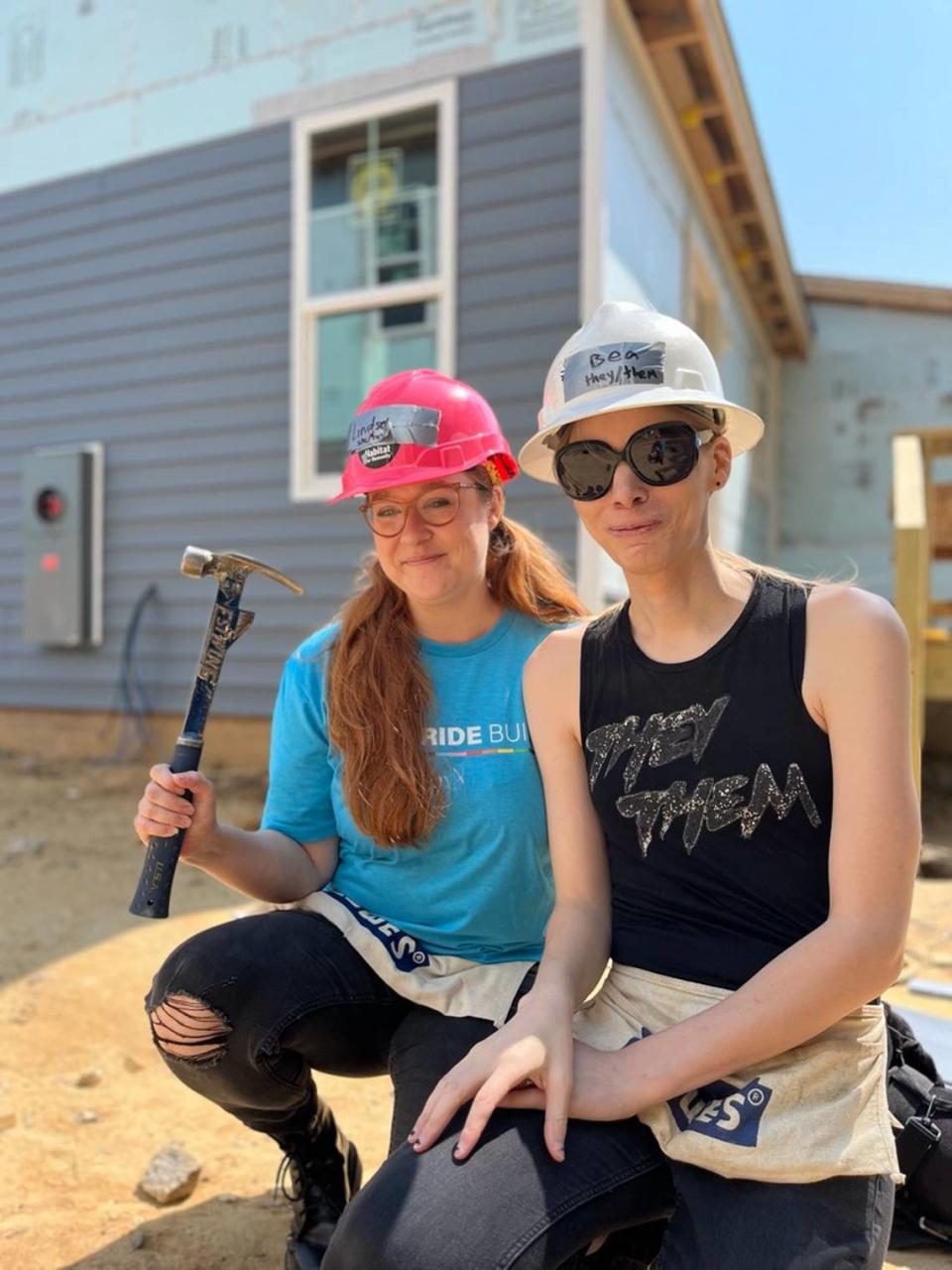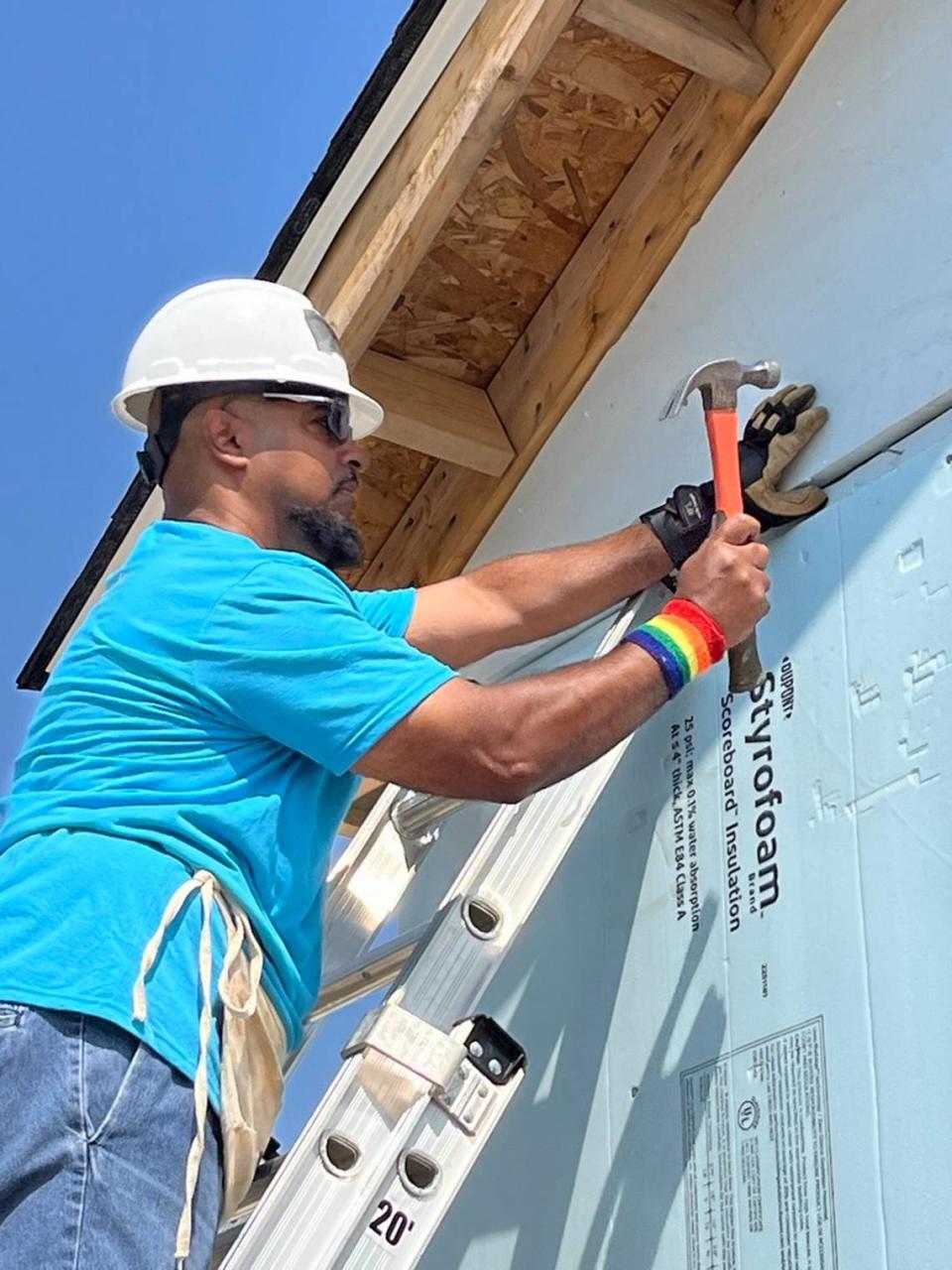Pride Builds from Habitat for Humanity could help Charlotte’s LGBTQ+ affordable housing crisis
Habitat for Humanity International was established in 1976 with the idea of using partnerships and volunteers to help build homes for those in need. Since its inception, the nonprofit has helped more than 39 million families build safe, stable housing in an effort to create generational wealth in low-income families.
Among those marginalized groups who are disproportionately impacted by the lack of affordable housing are LGBTQ+ people.
According to studies provided by the Human Rights Campaign, more than 22% of LGBTQ+ identifying people live in poverty compared to 16% of heterosexual, cisgender people. To break it down further, almost 30% of trans people and cisgender bisexual women, 19.5% of cisgender bisexual men, almost 18% of cisgender lesbian women and 12% of cisgender gay men live below the poverty line.
Discrimination could account for why queer-identifying people have a hard time finding affordable housing. In North Carolina, specifically, there isn’t a statewide law prohibiting discrimination on the basis of sexual orientation, but individual municipalities can elect to pass their own non-discrimination ordinances.
Habitat for Humanity in Charlotte has played an integral role in creating affordable housing options across the city, with more than 4,000 families in the city receiving help from the local Habitat.
One of the builds from 2016 aimed to partner with a local LGBTQ+ organization known as the Plus Collective — then called the Charlotte Lesbian and Gay Fund — to build a home for a mother of four in the Lincoln Heights neighborhood.
Since then, the Charlotte Habitat has yet to complete another Pride building project. However, other Habitats across the state have started and continued Pride builds, utilizing partnership models similar to the one between the Lesbian and Gay Fund and Charlotte’s Habitat.

The 2016 Rainbow Build
Charlotte’s Habitat for Humanity partnered with the Lesbian and Gay Fund, which pledged $5,000 toward building a home, to bring volunteers from all backgrounds to help build a residential structure. Former Habitat for Humanity employee Bettie Coltrane said in 2016 the Pride Build signified two differing groups coming together.
“I’ve seen it over and over at Habitat and where two very diverse people come together on a build, and when you are working on the same goal, it tends to bring people together rather than highlight their differences,” she explained.
At the time of the Charlotte Rainbow Build, HB2 was at the forefront of the North Carolina political climate. Habitat for Humanity is a Christian, faith-based organization, which has a very different background than most organizations who work with LGBTQ+ folks.
Jeremy Hall is the Director of Development at Charlotte’s Habitat, and at the time of the 2016 build, he was with both Habitat and the Lesbian and Gay Fund. He said he felt it was important for Habitat to step up and take on Pride-centric projects, especially given its reputation as a faith-based organization.
“We wanted to say very clearly that we stand with our LGBTQ+ community and we want to help them find home and stability and affordable living,” he explained to Qnotes. “[We felt] participating in a rainbow build will help to dismantle some of those belief systems that keep people from getting involved.”
Linda Lawyer, who volunteered with the Lesbian and Gay Fund, called the build a “Rainbow Build,” as a direct tie-in to the community it was meant to serve.
“They want to bring in the gay and lesbian community to help build this house,” Lawyer said to Spectrum News. “It shows that we can work together — we really want to work with everybody, and what’s better than building a house?”
There’s a reason Charlotte’s Habitat for Humanity hasn’t completed another Pride-centric project since the Rainbow Build in 2016. Hall confirms it was able to happen because the Lesbian and Gay Fund provided the $5,000 grant and since then, there hasn’t been an organization that has taken up the initiative.
However, if an organization would be willing to partner with Habitat for a Pride building project, Hall said it would help reopen the doors to doing another Rainbow Build.
“If we found the right community partner, we could certainly move back in that direction, but I think it doesn’t make much sense without some kind of community partnership,” he explained. “All of our partners are supporting really great things in the community, but the only reason right now we don’t have an active partnership for a Rainbow Build is because the right community partner has to help us get there.”
Qnotes reached out to the Plus Collective, asking for information regarding the 2016 build. A spokesperson from the Plus Collective stated the organization was approached by Habitat in 2016 regarding the Rainbow Build, stating the following:
“It sounds like when we were presented with the opportunity to participate in the build, we were unable to provide volunteers on short notice to do so. Additionally, Habitat did not collect [information on] whether the family identified with the LGBTQ+ community as it was a potential prohibited basis from a fair lending perspective — therefore, we don’t know if the family aligned with our organization or not.”
Other Pride Builds across the state
While there isn’t much information on Charlotte’s Rainbow Build, other Habitat chapters elected to start their own Pride build initiatives. Wake County’s Habitat for Humanity built a home on June 9 this year in partnership with Enact and the LGBT Center of Raleigh as a way to “support inclusive, affordable housing,” for queer people.
Raleigh’s Pride Build took place in a Habitat build neighborhood called Old Poole Place, which is located off of Old Poole Road. Once the neighborhood is completed, it will be an entirely Habitat-built community with a mix of single-family homes and townhomes. Habitat also plans to connect the neighborhood to public transportation systems, including GoRaleigh stations and bus routes, in an effort to connect the neighborhood to the rest of the city.
“Habitat’s mission is to bring people together to build homes, communities and hope and that’s every Habitat’s mission,” Olivia Bawler of Habitat for Humanity Wake County told Qnotes. “How we interpret that mission … can vary, but for us here in Wake County, we’re particularly in the seat of the state government and so we do a lot [of] advocating for policy change that helps people across the continuum access housing, and that’s not accessible to everyone right now.
“So we try to influence those other kinds of ends of the spectrum.”

Lindsey Halliday and her partner Bea — who’ve been together for over 15 years — worked alongside more than 70 volunteers, building the first home the two ever owned for this year’s Pride build.
“There’s not a lot of laws protecting discrimination. You can get evicted just for being trans (or) just for being gay,” Lindsey explained in June.
Bea, who is transitioning, expressed the couple was always concerned about their landlords discovering her and Lindsey’s relationship.
“I don’t think our landlord knows anything about us and that’s really for the best,” said Bea. “It’s terrifying knowing at any moment I can lose my job and lose my house with no notice because there’s nothing protecting me here.”
Bawler said the Pride build came about two years ago after Wake County’s Habitat talked to other chapters across the country about what they were doing to address affordable housing concerns in the LGBTQ+ community.
“Working with other organizations who are doing either similar work or working with organizations who have subject matter expertise, like the LGBT Center in Raleigh, are ways that we can kind of extend our reach and have more impact together,” she explained.
Wake County’s Habitat wasn’t the only one in the Triangle holding Pride builds — Durham’s Habitat partnered with Gays 4 Good, a LGBTQ+ volunteer organization, to have its own Pride build on June 3. In addition, the Orange County Habitat for Humanity established a new initiative called Building Pride, which aims to “focus on the unique issues faced by LGBTQIA+ and more specifically, trans and gender-nonconforming people.”
The Wake County Habitat chapter has worked to reach out to members of the queer community through various outreach efforts, including attending Out! Raleigh on June 24 with the LGBT Center of Raleigh. Bawler said she hopes through these outreach opportunities, the Wake County Habitat can expand its Pride build year after year.
“We have more room to engage other local LGBTQ organizations, particularly being in the seat of the state government,” she explained. “I think there’s several statewide organizations that we’ve started to work with, including Harmony (NC LGBT+ Chamber of Commerce), for example.
“So we have the benefit of accessing statewide organizations in addition to local organizations, and I think that gives us an opportunity to make it bigger, to raise more money and to raise more awareness for this particular need for affordable housing.”

Could Pride build initiatives be replicated?
The short answer to the question is yes, but the long answer is more complicated.
The original Rainbow Build in 2016 required partnerships with community organizations, and other Habitat LGBTQ+ Pride initiatives have been driven through partnerships. Bawler said Wake County’s program wouldn’t have been made possible without the partnership the Habitat has with the LGBT Center. Education is also an important factor in Habitat’s mission, so Bawler said in order for initiatives like Pride Builds to be successful, they must aim to educate LGBTQ+ folks about homeownership and affordable housing.
“For us, community outreach has looked like primarily participating in events that are targeting the audience that we’re hoping to also target with our homeownership and home preservation programs — so that might be participating in that rally or it might be interacting with the business community,” she explained.
“We’d encourage any Habitat who’s interested to start their own Pride Build. Starting to build relationships in the community is an essential first step, and it continues to be something that we hope to grow in as we continue to grow Pride Build itself.
“I think for any Habitat looking to start a build like this, I would say start with key community relationships.”
Hall said he hopes for the Rainbow Build to return one day in partnership with LGBTQ+ advocacy groups in the Charlotte area.
“There’s some things that straight couples have that makes it easier for them to have access to equity and affordable homes,” he explained. “There’s just such a need there and I thought it’d be a great way to show up in the housing space … [when] the day comes we find the right community partnership, I would personally love to pick this project back up.”
This story is part of ‘I Can’t Afford to Live Here,’ a collaborative reporting project focused on solutions to the affordable housing crisis in Charlotte.
Qnotes is part of the Charlotte Journalism Collaborative (CJC), launched by the Solutions Journalism Network with funding from the Knight Foundation. The CJC strengthens the local news ecosystem and increases opportunities for engagement. It is supported by a combination of local and national grants and sponsorships. For more information, visit charlottejournalism.org.

